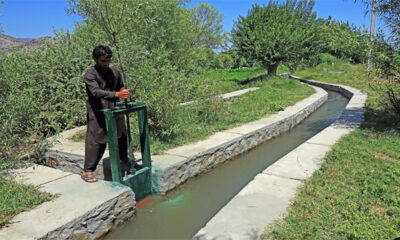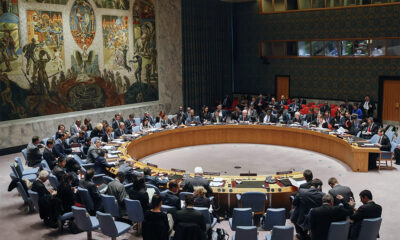Latest News
Afghan-Iranian officials move to strengthen relations and tighten border controls
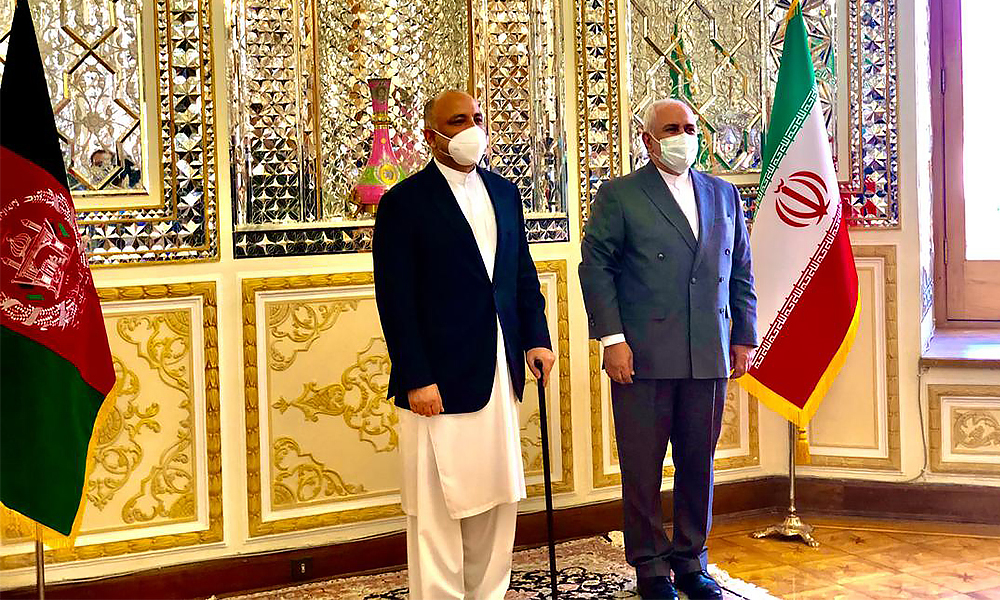
Afghanistan’s acting minister of foreign affairs Mohammed Haneef Atmar, and his Iranian counterpart Mohammad Javad Zarif have agreed to take all necessary measures to prevent illegal border crossings and human trafficking by stepping up controls over the shared boundary.
This decision was announced late Monday night in a joint statement issued by the two officials as Atmar wrapped up a two-day official visit to Afghanistan’s neighboring country.
According to the statement, the security-frontier committee and the committee on the legalization of residence of nationals of the two countries on each other’s soil were assigned to adopt the necessary measures to ensure the security of the common border in order to prevent illegal travel, human trafficking, and smuggling.
“In this regard, the two sides highlighted the need for the Afghan security forces to be present in the border outposts emptied in Afghanistan, and for the Islamic Republic of Iran to facilitate issuing visas,” read the statement.
ﺑﯿﺎنیه ﻣﺸﺘﺮک وزرای اﻣﻮر ﺧﺎرجه ﺟﻤﮭﻮری اﺳﻼﻣﯽ اﻓﻐﺎﻧﺴﺘﺎن و ﺟﻤﮭﻮری اﺳﻼﻣﯽ اﯾﺮانhttps://t.co/vdQBJsllYl pic.twitter.com/GIcIjYkmYP
— MFA Afghanistan 🇦🇫 (@mfa_afghanistan) June 22, 2020
Both sides also stressed the “need for the border guards of the two countries to monitor and control the common borders strictly and effectively, and undertook to prevent illegal border-crossing, human trafficking, and smuggling of drugs and any other items into the territory of each other.”
An agreement was also reached regarding mutual cooperation in observing international health regulations at the border crossings.
Numerous meetings were held during the two-day visit where a wide range of issues was discussed, including the expansion of relations between the two countries in various fields within the framework of eight working committees.
This includes committees on comprehensive documentation, legalization of residence of nationals, border cooperation, labor, water, cultural cooperation, energy, and health issues.
The two sides stated that in order to institutionalize and organize sound bilateral relations, Afghanistan and Iran would proceed with negotiations to finalize a comprehensive document on strategic cooperation and have this document finalized and ready to be signed within three months.
Iran also stated that it welcomed the peace process efforts and expressed readiness to help facilitate intra-Afghan negotiations. They also stated they would be willing to host such negotiations.
Both sides emphasized the need to reduce violence in Afghanistan “with the purpose of building trust and creating a positive atmosphere in order to launch the intra-Afghan negotiations as soon as possible, achieve a lasting ceasefire, and establish sustainable peace.”
“Considering the significance of regional and international consensus on the establishment of peace and security in Afghanistan, the two sides stressed the need to strengthen the regional and international cooperation and consultations and activate the capacities available in the region with the purpose of facilitating the negotiations and supporting the Islamic Republic of Afghanistan’s establishment,” read the statement.
Both countries agreed that there was also a need to carry out joint programs in promoting common areas including that of the heritage of language, religion, and culture, as well as educational cooperation.
Detailed discussions were also held on recent incidents that resulted in human fatalities.
This comes after tension heightened early last month after reports emerged that Iranian border guards had allegedly beaten and thrown about 50 Afghan migrants into the Harirud river.
Iran has refuted these claims and said the incident, which resulted in the death of some migrants, happened on the Afghanistan side of the river.
The statement, however, indicated that Iran had informed the Afghan side of progress around ongoing investigations, and both sides agreed to adopt measures to prevent any recurrence of such an incident.
Discussions on boosting economic ties were also held and the two sides agreed on a number of cooperation initiatives in the transport and transportation sectors. Chabahar Port was highlighted as being the “driving engine of trade-transit cooperation in the region.”
Both sides agreed there was a need to provide welfare facilities at border crossings and that joint action was needed as a matter of urgency to “repair the infrastructure and the asphalt road for motor vehicles at the Dogharoun border crossing.”
Meanwhile, on Tuesday, Iran’s Foreign Ministry Director-General for West-Asia Seyed Rasoul Mousavi hailed Atmar’s visit.
“As an expert, I would like to say the visit of FM Atmar to Tehran was a very important and comprehensive one,” Mousavi Tweeted on Tuesday.
“Negotiations & agreements were reached in all areas. The joint statement of the visit is cold water on the fire of the ill-wishers of Iran & Afghanistan relations,” he added.
Iran has over the past 40 years hosted millions of Afghan refugees. According to Iran, it currently hosts about 1.5 million Afghan refugees who are living in the country illegally, in addition to about 800,000 documented
Latest News
2023 marred by ‘tremendous challenges’ for Afghanistan
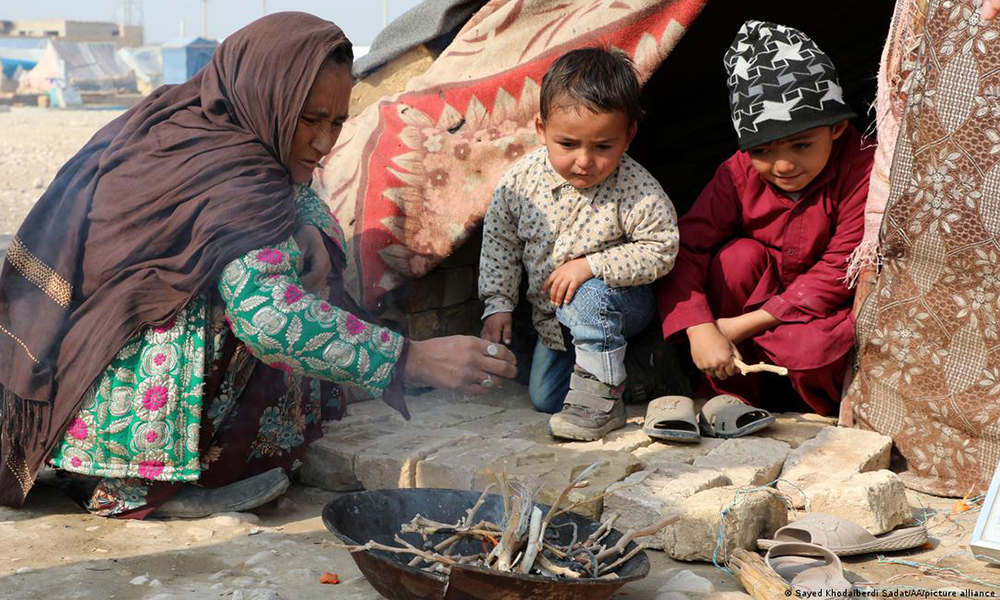
Last year, 2023, was a year of “tremendous challenges” for the people of Afghanistan, but it was also a year marked by resilience and determination, the Deputy Special Representative of the Secretary-General, Resident and Humanitarian Coordinator, Indrika Ratwatte, said in the UN’s annual report on Afghanistan that was published this week.
Ratwatte said: “In the face of adversity and multiple concurrent shocks, the people of Afghanistan have demonstrated remarkable courage and strength.”
Afghans now mention access to food as their most pressing need, he said adding that “unable to pay for or produce basic sustenance, millions face hunger and malnutrition.”
In 2024, an estimated 15.8 million people will experience crisis and emergency levels of food insecurity.
The majority of the population is unable to procure basic needs such as healthcare, food, livelihoods, and housing, the report stated.
The UN found that the country also remains vulnerable to climate change.
Following the worst drought in three decades, emerging El Niño conditions now threaten a new cycle of flooding and crop pests. In this context, lifesaving humanitarian aid has been crucial in preventing the collapse of the social fabric. It has also served to underpin the stability of the economy. Despite growing humanitarian needs, relevant funding cuts have forced humanitarian actors to prioritize the most vulnerable further, the report stated.
A Gallup poll found that 95 percent of the population consider themselves to be suffering. In addition to living in poverty, the average life expectancy in Afghanistan has been falling for the past five years.
The Herat earthquakes and unprecedented large-scale returns of refugees from neighbouring countries, including Pakistan and Iran, have shown the disruptive impact of recurrent shocks and underscored the need for sustained international engagement and support, the UN stated.
“As we embark on the next chapter, in 2024, it is imperative that we remain steadfast in our commitment to the principles of human rights, gender equality, and women’s Empowerment,” Ratwatte said.
“We will continue to include women as key partners in our work, to provide assistance ‘by women, for women’, and to tirelessly work for equal access to education in line with the demands we hear from Afghans in all areas of the country,” he said.
However, from an economic point of view, Afghanistan’s economy appears to be stabilizing at a low equilibrium level following a period of significant contraction since 2021.
The UN said in the report that growth barriers include severely restricted operations in the banking sector (including microfinance institutions), trade disruptions, and institutional issues hindering service delivery, including in the private sector.
“The sudden cessation of a significant amount of international aid and grants, which had accounted for 40 percent of the country’s Gross Domestic Product (GDP), along with a freeze on international reserves amounting to about US$9 billion and the imposition of international sanctions, caused a severe balance of payments, banking and payment systems crisis.
“Notably, financial restrictions have removed liquidity from the banking system,” the report stated.
Despite the crisis and a period of devaluation towards the end of the year, the AFN is 20 percent stronger than it was in 2021 due to currency export controls, UN cash shipments of US dollars into Afghanistan, and personalremittances.
Imports continued to surpass exports through 2023 and increased as the economy contracted.
“This appears to be a paradox: the currency appreciated while the trade deficit widened, suggesting that there might be other unidentified sources of financing besides US dollar cash shipments and remittances to support the account deficits,” the report read.
The UN also said that with its partners, it will work to initiate a dialogue with the Islamic Emirate on adjustments to regulatory frameworks and sustained public service delivery with the aim of creating a long-term and sustainable pathway to reduce aid dependency and put Afghanistan back on a path towards development
“In this regard, we reiterate our offer to the DFA for a dialogue and will work jointly with international partners, donors, and Afghans on how such engagement can be structured in a most productive way.”
Latest News
Beijing hosts Afghan delegation for talks on a wide range of issues

The third meeting of the China-Afghanistan working-level liaison mechanism on humanitarian assistance and economic reconstruction was held in Beijing this week where in-depth talks were held on numerous issues relating to Afghanistan.
Liu Jinson, Director of the Asian Department of China’s Ministry of Foreign Affairs, and Jalali, Director of the Third Political Department of the Ministry of Foreign Affairs of Afghanistan, co-chaired the Beijing meeting.
Also in attendance were representatives from various Chinese commissions, government departments, international aid organizations, as well as the Afghan Ministry of Commerce and Industry, the Ministry of Mines and Petroleum, the Ministry of Disaster Management, and the Ministry of Refugee Affairs.
Quoting an Afghan proverb, Liu said at the meeting that “friends come and go, but neighbors always remain.”
He pointed out that since 2021, China has implemented a diplomatic concept of amity, sincerity, mutual benefit and inclusiveness that was proposed by President Xi Jinping in terms of Beijing’s dealings with Afghanistan.
China has also adhered to a friendly policy towards all Afghan people, and adhered to the principle of respect for the country’s independence, sovereignty and territorial integrity.
He also said that during the different regimes in Afghanistan, China has always provided support and assistance for Afghanistan’s peaceful reconstruction and economic development.
The Afghan delegation meanwhile stated that the Islamic Emirate attaches great importance to developing relations with China, and thanked China for taking the lead in sending a new ambassador to Afghanistan and accepting the appointment of an ambassador to China.
The Islamic Emirate said Afghanistan is willing to deepen friendly relations with China, maintain traditional friendship, and will, as always, support China in safeguarding its core interests and achieving national reunification.
The two sides agreed in the meeting that Afghanistan is currently facing multiple challenges such as floods, droughts, and refugee resettlement, among other issues.
They also noted that the freezing of Afghanistan’s foreign assets by the United States has “aggravated the suffering of the Afghan people.”
The IEA stated however that it was “very grateful to China for its humanitarian assistance over the years and hopes to continue to receive help from China in refugee resettlement, disaster prevention and mitigation, improvement of medical and health conditions, and treatment of children with congenital heart disease.”
On the Belt and Road initiative, the IEA delegation said Afghanistan is deeply satisfied with the progress in practical cooperation between the two countries. They also said Afghanistan is willing to learn from China’s experience in modernization and development, and hopes that China will help Afghanistan cultivate more professional talents.
China meanwhile urged the international community to step up humanitarian assistance to Afghanistan, and said Beijing hopes the IEA will “actively respond to some of the international community’s reasonable concerns about Afghanistan’s inclusive governance.”
Liu in turn acknowledged the IEA’s efforts to promote economic reconstruction and said bilateral trade volume between China and Afghanistan reached US$1.33 billion last year, a record high and a year-on-year increase of 125.4%.
The Islamic Emirate meanwhile said in posts on X that the issue of investment opportunities in Afghanistan was widely discussed and both sides welcomed moves to pave the way for the export of pomegranates.
“Also, both sides talked about the latest developments in increasing the level of oil extraction in Afghanistan and starting the extraction of Logar’s Mes Aynak mine and it was emphasized that plans should be considered to speed things up,” the IEA stated.
“The Afghan side welcomed the capacity building training programs of civil servants in many ministries and agencies of the Afghan government with the support of China. In addition, the Chinese side promised to expand the range of scholarships to Afghan students according to the needs of Afghanistan,” the IEA stated.
Latest News
UN builds 470km of water canals in Afghanistan in past year
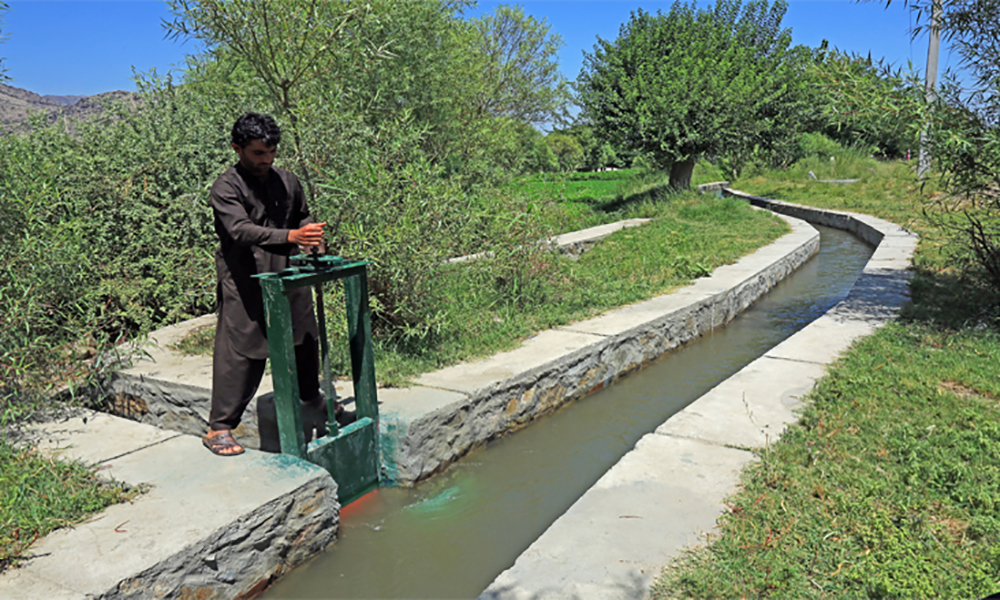
The United Nations has built 470 kilometers of much needed water canals in Afghanistan in the past year in cooperation with local communities, the World Food Program (WFP) confirmed.
WFP in Afghanistan said in a post on X, formerly Twitter, on Wednesday that the canals were built in order to provide access to water to more people across the country.
The agency said the people “in Afghanistan cannot continue their lives without access to water,” adding that the canals help farmers irrigate crops, which allows them to feed their families and sell surplus produce.
This comes after years of drought across the country. However, in the past few months, good rain has been recorded which will hopefully result in good harvests this year.
-

 Sport4 days ago
Sport4 days agoACL draw to be broadcast live on ATN channels
-

 Regional5 days ago
Regional5 days agoIRGC chief warns of harsher response if Israel attacks Iran
-

 Sport3 days ago
Sport3 days agoACL fever grows as fixtures finalized
-

 Regional5 days ago
Regional5 days agoIran launches retaliatory attack on Israel with hundreds of drones, missiles
-
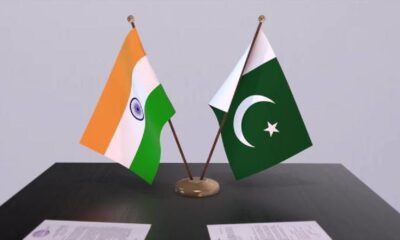
 Latest News5 days ago
Latest News5 days agoContact group on Afghanistan hits roadblock over Pakistan’s gripe with India
-

 Sport5 days ago
Sport5 days agoHetmyer powers Rajasthan win in low-scoring IPL thriller
-
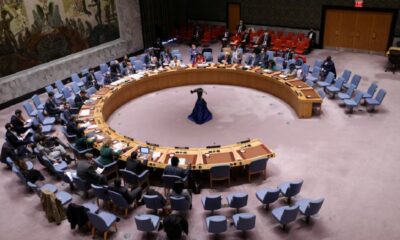
 World5 days ago
World5 days agoUN Security Council to meet Sunday on Iran attack
-

 World4 days ago
World4 days agoUS will not take part in any Israeli retaliatory action against Iran










